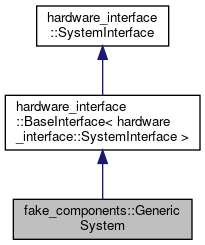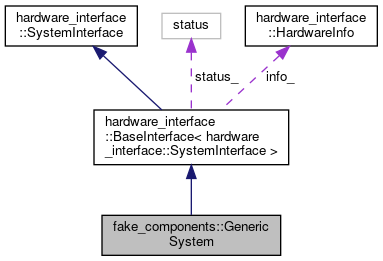

Classes | |
| struct | MimicJoint |
Public Member Functions | |
| return_type | configure (const hardware_interface::HardwareInfo &info) override |
| Configuration of the system from data parsed from the robot's URDF. More... | |
| std::vector< hardware_interface::StateInterface > | export_state_interfaces () override |
| Exports all state interfaces for this system. More... | |
| std::vector< hardware_interface::CommandInterface > | export_command_interfaces () override |
| Exports all command interfaces for this system. More... | |
| return_type | start () override |
| Start exchange data with the hardware. More... | |
| return_type | stop () override |
| Stop exchange data with the hardware. More... | |
| return_type | read () override |
| Read the current state values from the actuators and sensors within the system. More... | |
| return_type | write () override |
| Write the current command values to the actuator within the system. More... | |
 Public Member Functions inherited from hardware_interface::BaseInterface< hardware_interface::SystemInterface > Public Member Functions inherited from hardware_interface::BaseInterface< hardware_interface::SystemInterface > | |
| return_type | configure (const HardwareInfo &info) override |
| return_type | configure_default (const HardwareInfo &info) |
| std::string | get_name () const final |
| status | get_status () const final |
 Public Member Functions inherited from hardware_interface::SystemInterface Public Member Functions inherited from hardware_interface::SystemInterface | |
| virtual return_type | prepare_command_mode_switch (const std::vector< std::string > &, const std::vector< std::string > &) |
| Prepare for a new command interface switch. More... | |
| virtual return_type | perform_command_mode_switch (const std::vector< std::string > &, const std::vector< std::string > &) |
Protected Attributes | |
| const std::vector< std::string > | standard_interfaces_ |
| Use standard interfaces for joints because they are relevant for dynamic behaviour. More... | |
| const size_t | POSITION_INTERFACE_INDEX = 0 |
| std::vector< MimicJoint > | mimic_joints_ |
| std::vector< std::vector< double > > | joint_commands_ |
| The size of this vector is (standard_interfaces_.size() x nr_joints) | |
| std::vector< std::vector< double > > | joint_states_ |
| std::vector< std::string > | other_interfaces_ |
| std::vector< std::vector< double > > | other_commands_ |
| The size of this vector is (other_interfaces_.size() x nr_joints) | |
| std::vector< std::vector< double > > | other_states_ |
| std::vector< std::string > | sensor_interfaces_ |
| std::vector< std::vector< double > > | sensor_fake_commands_ |
| The size of this vector is (other_interfaces_.size() x nr_joints) | |
| std::vector< std::vector< double > > | sensor_states_ |
 Protected Attributes inherited from hardware_interface::BaseInterface< hardware_interface::SystemInterface > Protected Attributes inherited from hardware_interface::BaseInterface< hardware_interface::SystemInterface > | |
| HardwareInfo | info_ |
| status | status_ |
Member Function Documentation
◆ configure()
|
overridevirtual |
Configuration of the system from data parsed from the robot's URDF.
- Parameters
-
[in] system_info structure with data from URDF.
- Returns
- return_type::OK if required data are provided and can be parsed, return_type::ERROR otherwise.
Implements hardware_interface::SystemInterface.
◆ export_command_interfaces()
|
overridevirtual |
Exports all command interfaces for this system.
The command interfaces have to be created and transferred according to the system info passed in for the configuration.
Note the ownership over the state interfaces is transferred to the caller.
- Returns
- vector of command interfaces
Implements hardware_interface::SystemInterface.
◆ export_state_interfaces()
|
overridevirtual |
Exports all state interfaces for this system.
The state interfaces have to be created and transferred according to the system info passed in for the configuration.
Note the ownership over the state interfaces is transferred to the caller.
- Returns
- vector of state interfaces
Implements hardware_interface::SystemInterface.
◆ read()
|
overridevirtual |
Read the current state values from the actuators and sensors within the system.
The data readings from the physical hardware has to be updated and reflected accordingly in the exported state interfaces. That is, the data pointed by the interfaces shall be updated.
- Returns
- return_type::OK if the read was successful, return_type::ERROR otherwise.
Implements hardware_interface::SystemInterface.
◆ start()
|
inlineoverridevirtual |
Start exchange data with the hardware.
- Returns
- return_type:OK if everything worked as expected, return_type::ERROR otherwise.
Implements hardware_interface::SystemInterface.
◆ stop()
|
inlineoverridevirtual |
Stop exchange data with the hardware.
- Returns
- return_type:OK if everything worked as expected, return_type::ERROR otherwise.
Implements hardware_interface::SystemInterface.
◆ write()
|
inlineoverridevirtual |
Write the current command values to the actuator within the system.
The physical hardware shall be updated with the latest value from the exported command interfaces.
- Returns
- return_type::OK if the read was successful, return_type::ERROR otherwise.
Implements hardware_interface::SystemInterface.
Member Data Documentation
◆ standard_interfaces_
|
protected |
Use standard interfaces for joints because they are relevant for dynamic behaviour.
By splitting the standard interfaces from other type, the users are able to inherit this class and simply create small "simulation" with desired dynamic behaviour. The advantage over using Gazebo is that enables "quick & dirty" tests of robot's URDF and controllers.
The documentation for this class was generated from the following files:
- hardware_interface/include/fake_components/generic_system.hpp
- hardware_interface/src/fake_components/generic_system.cpp
 1.8.13
1.8.13